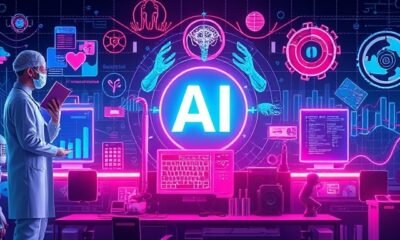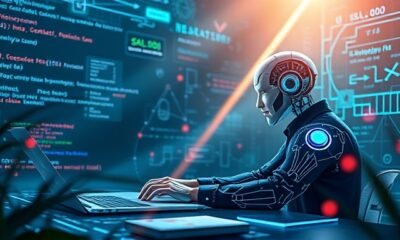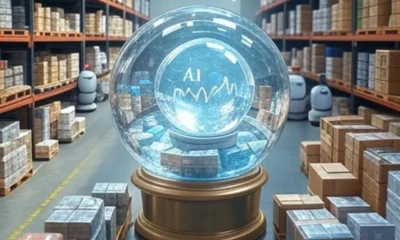Artificial Intelligence
How a $500 Billion Investment Is Reshaping the Future
The U.S. is positioning itself as a global AI superpower through massive investments, innovation hubs, and strategic policy shifts. Learn how this impacts our economy, national security, and daily lives.

A bold claim I read recently is that: the U.S is on the verge of a becoming an AI superpower. That started my thinking, what on earth does this mean to us Americans? It is not the only one saying that Scott Bessent, Treasury Secretary, isn’t. Even big tech chiefs such as Jensen Huang, chairman and CEO of Nvidia, support the idea quoting $500 billion in artificial intelligence investments.
Definition:
U.S would be the pioneer of the world when it comes to artificial intelligence development, use and innovation if it became an AI superpower.
This is not just another CGI catchphrase – it’s changing our jobs, our national security and how we live day to day. I’ll take you from what this shift actually means (to me and you), the implications of this shift, and the urgency of that shift today, more than ever before.
Setting the Stage: America’s Race to AI Supremacy
- I’ve can been watching the AI race worldwide and it’s getting really hot. Countries such as China and EU are not waiting. They’re moving seriously, investing billions into artificial intelligence research, and tech infrastructure.
- China has a national AI strategy to be a global leader by 2030. The EU is looking into the investment of ethical AI frameworks that will make it competitive. But if I think of the bigger picture, even U.S has a colossal advantage, and I’ll tell you why.
Why can the U.S. have a big AI advantage?
- U.S. is where you’ll find Big Tech behemoths Google, Microsoft, Meta, Amazon, and Nvidia – and they are fully-invested in AI. These are the companies that construct the AI tools, platforms and models that actually define our digital lives day in and day out.
- With MIT, Stanford and OpenAI among the greatest, our nation conducts leading research in AI. These places are creating the future not simply observing it unfold.
- We also have nothing to envy of in terms of access to private capital and federal funding. That means AI startups, labs, and innovation centers receive the support that is necessary to scale fast.
How is government in the U.S. promoting AI innovation?
- Administration is not standing by. President Biden signed Executive Orders about AI safety, and development that promote responsible innovation, and on data privacy that promote responsible innovation.
- National AI Research Resource (NAIRR) initiative is another great step. It links researchers to very powerful computing instruments and datasets to lead breakthroughs in various sectors.
- In my opinion, this policy momentum signals to me that Washington understands that AI leadership is not only about tech, it is about national power and future economic.
Scott Bessent’s AI Superpower Declaration:
- I recently learnt that the new Treasury Secretary Scott Bessent has declared the U.S on the brink of being an AI superpower. This caught my eye because it is a monumental change in the view of artificial intelligence by our government.
- Bessent made this statement during a recent public address highlighting the administrations desire to lead in AI development. He underscored the need for great investments and strategic planning to qualify for this goal
Who is Scott Bessent?
Scott Bessent is an established financial pro who has spent decades in the world of global investment management. He was a career macro hedge fund manager and founded Key Square Group, a global macro investment firm, before being appointed as Treasury Secretary. His experience involves working at the side of international leaders and central bankers, and this gives him a special insight into the state of global economy.
His Statement:
In his pronouncement, the administration’s key on artificial intelligence, a pillar of economic policy, in Bessent’s view is revealed. He emphasized the need of massive investments in AI for the United States to be competitive on the world platform. The comments by Bessent appear to be an approach on how best to integrate AI into the aspects of the economy.
Why It Matters?
According to the comment from Bessent, AI is now seen by the Treasury department as a strategic economic pillar. This view fits in with the national industrial policy and plan for infrastructure investments, which avaunt the governments desire to promote AI development. The U.S. administration wants to advance innovation and improve productivity by focusing on AI and ensure the U.S. stays at the fore front of technological innovations.
The $500 Billion Investment Wave:
I read the other day that Nvidia CEO Jensen Huang declared a staggering $ 500 billion investment in U.S. AI infrastructure at a White House event. This initiative referred to as the Stargate project with a view to building high tech data centers and strengthening its AI capacity all across the country.
Facebook
+9
The White House
+9
YouTube
+9
Reuters
+3
AP News
+3
Financial Times
+3
Nvidia’s work is critical in this effort, concerned with the making of AI chips and the corresponding infrastructure within US borders. This kind of development means a strategic move away from Asian manufacturing and its effects in terms or reliability of supply chain and geopolitical issues.
Financial Times
+2
Manufacturing Today
+2
Business News Today
+2
What do the $500 billion investments include:
Investment is a joint effort by such big tech corporations as Microsoft, Google, Amazon, and Oracle. Such corporations are redirecting money into different sectors to improve AI development and deployment.
Private Sector:
Nvidia’s dedication toward manufacturing AI chips in the U.S.
Microsoft’s planned $80 billion investment to AI enhanced data centers.
Amazon’s massive investment on AI infrastructure (with $24.3 billion in Q1 2025, for instance).
Business Insider
+2
The Official Microsoft Blog
+2
MarketWatch
+2
MarketWatch
Private Sector:
The commitment by Nvidia to supplying AI chip manufacture in the U.S.
Microsoft’s projected $80 billion in investment in AI enabled data center.
Amazon huge outlay on AI infrastructure, an amount of $24.3 billion in Q1 2025, alone.
Business Insider
+2
The Official Microsoft Blog
+2
MarketWatch
+2
MarketWatch
Public Sector:
- CHIPS Act funding intended to increment semiconductor manufacturing capacity.
- Department of Defense investments for AI-ready data- and computation-environments.
NPresouvědchtivost AI zdrojů, Impact of Automated Machine Learning (AutoML): Democratizing AI via Harvey Mudd’s National Science Foundation’s National AI Research Resource (NAIRR) initiative.
BCG Global
+15
AI Now Institute
+15
Hai Production
+15
PYMNTS.com
+3
U.S. Department of Defense
+3
Bain
+3
PYMNTS.com
Venture Capital and Startups:
A significant amount of money was invested in the fundings to AI startups like xAI, which received $6 billion, which were used on high returns infrastructure and advanced product development.
Welcome | UAE Embassy
Where is the money going:
- Some of the large scale allocation of investment is being directed at the following critical areas of development:
- AI Chips and Semiconductors:
- Production and manufacturing of next generation AI chips to balance growing computational needs.
- Data Centers and Cloud Infrastructure:
- Setup of high performance computing facilities to facilitate AI model training and deployment.
- Large Language Model (LLM) Development:
- Progression of the basic AI models for improving strengths in natural language processing and comprehension.
- AI Applications in Healthcare, Defense, and Finance:
- Deployment of AI solutions for that of diagnosing, strategic defenses, and financial analytics.
- This expansive investment plan signifies America’s determination to dominate the global AI horizon, stimulating innovation, and procuring economic expansion.
Strategic Sectors Being Transformed:
- I’ve experienced for myself all of the ways that artificial intelligence is impacting nearly all of the big sectors in America. Starting from chips that power our smartphones, to tools used both in our classrooms and our military defenses protecting our country—AI is changing everything.
- Now, let’s look at the strategic sectors pushing the U.S. through this AI revolution.
Semiconductors: What Nvidia and AMD are driving into line with AI hardware:
American technology giant’s companies such as Nvidia and AMD are at the centre of AI hardware innovation in the U.S. They are designing the strong chips that allow to run large language models, robotics as well as real time data systems.
- Without these AI chips not any of this new technology can work. To me, this is the digital oil running the America’s AI engine.
Cloud and Infrastructure: AWS, Azure, and Google Cloud See AI capacity increasing:
- AI requires what all data programmers need, storage, processing and speed and the big cloud players are getting more aggressive. AWS, Azure and Google Cloud are growing fast, and establishing next-gen data centers for AI.
- These platforms enable startups and researchers, as well as such enterprises as us, to use AI tools on demand from any device without having massive servers.
Defense and National Security: DARPA, Palantir, and IED minders with AI power:
- The DOd is very big with AI and I think that’s one of the most important things to keep an eye on. DARPA and Palantir are driving initiatives to build smarter, faster and more autonomous defense systems.
- AI is now part of our playbook of national security missions from battlefield intelligence to cyber protection.
Education and Workforce:
- In order to compete, we need to train people, not machines. The government is rolling out federals training programs on AI literacy and digital skills.
- Community colleges and vocational programs are also preparing the workers of tomorrow to use AI not fight it. I think this is what is necessary to reduce fears of displacement of jobs.
AI Ethics and Governance:
- Government is also trying to make AI fair and transparent. They’ve teamed with academic researchers and nonprofit groups to set up responsible guidelines.
- This drive towards accountability and ethics means that AI decisions won’t hurt communities and propagate bias, which is a passion of mine as citizen and user of the products.
U.S. vs. China:
- When I consider the global race for AI, one country always pops up – China. They’re not simply creating AI systems, they’re dictating a world that will view and use artificial intelligence.
- This comparison is important because it affects our economy and security, even our daily freedoms.
What are China’s AI ambitions?
- Billions have been going into state-backed projects by China. Everything from facial recognition technology to autonomous drones in surveillance even has their government backing it.
- They have also embedded the AI heavily in their military strategy. That tells me they treat AI not just like tech – as power.
What does the U.S. look like out there?
- U.S. follows another rulebook. Our power derives from open innovation where startups, universities, and giants of tech do a collaborative effort to lead breakthroughs.
- But it’s not all smooth. The issue of AI chip exports is increasingly tense with regard to who controls the supply chain. I envision that this is the start of a techno-economic cold war, whose essence is AI.
Trending question of today: Do AI’s become a soft power weapons
- Yes and the U.S. knows it. AI is not only about tools. It’s about influence. Whether it regulates the world or promotes modeled ethics, the AI is emerging as a sort of soft power.
- That’s why I think that national security risks around AI are for real. If the U.S. fails to lead responsibly, it will be taken over by someone else – who can’t be trusted – and that could impact on all things from jobs to democracy.
How this Affects the Average American?
When I think of AI, I don’t just see robots or the big tech, I see how it’s already impacting me and millions of others already. Whether you are at work punching in or at the doctor’s, AI is slowly becoming part of day to day life.
What this AI boom really implies for all of us who live in the U.S. let’s dissect.
Job Creation:
- AI’s not just stealing jobs; it’s generating them, and quickly. Jobs such as prompt engineer, machine learning operations and AI ethicist are growing rapidly all over the country.
- These aren’t just tech jobs. The need for AI-savvy workers spans across industries from agriculture to finance, and that’s creating openings for individuals of people like me and you for reskill.
Economic Growth:
- Experts say over the next ten years AI could add trillions to our GDP. That is to say, more businesses growth, more employment and, hopefully, more stability in families.
- I view this as a one of a generation change that can change the American economy all over again just like the internet did a couple of decades back.
Daily Life Impact:
- AI is improving things in ways that you may even not know it. AI is helping doctors detect diseases before and teachers are using resources to personalize learning.
- Even your car navigation is fuelled by AI today and makes your transport safer and smarter using real time facts and predictive guidance.
Concerns to Watch:
- Of course, I’m not avoiding the risks either. Job displacement is a reality, particularly in repetitive/manual type assignments, and that concerns me.
- There is also problem of algorithmic bias and privacy. There is a need to agree on these tools being fair to every individual and the protection of our data or else there will be consequences that shall destroy trust.
Is America Prepared to be Number One?
- Digging in all the facts and trends and having asked myself one big question, I asked myself – is the U.S. ready to lead the world in AI? Based on what I’ve seen, the answer tends toward yes, but take the weight out of the contest.
- Let me take you step-by-step as to where we are and what that says about people like me and you.
What are our biggest strengths?
- First, we have something that most countries can’t; an unmatched innovation engine. It’s our startups, universities and tech giants who are dictating how AI works and how it is applied.
- And then we have our deep capital markets that circulates money up into bold new ideas. Add our pool of diverse global talent and the U. S is the country with the brain power and resources to lead.
What are the challenges ahead?
- But we do have some real obstacles. Regulatory ambiguity is causing things to slow—the people don’t know what is acceptable and what is ethical.
- We also have hard-going competition from other countries such as China internationally. And let’s not pretend either, the U.S. is still grappling with ethical issues of bias, surveillance, and misuse of data.
- Our leadership can slip if we don’t address these gaps soon.
My view on the future of things:
- In my opinion, if we maintain a fine balance between investment, innovation, and smart governance, the US can not only be a leader, but take the next AI age and own it.
- We’re not assembly lines, we’re creators of how humanity speaks to technology. That’s a lot of responsibility and I think we’re up to that if we just keep our heads in it.
Conclusion:
I see the U.S. in a position of strength but of urgency too as we were on the edge of this AI revolution. Our decisions today will determine our economy, our society and even our values for many years to come.
-

 Artificial Intelligence8 months ago
Artificial Intelligence8 months agoWhat is Artificial Intelligence? A Comprehensive Guide for Businesses and Enthusiasts
-

 Artificial Intelligence6 months ago
Artificial Intelligence6 months agoHow to Use Grok AI: A Complete Guide
-

 Artificial Intelligence8 months ago
Artificial Intelligence8 months agoUnlocking the Power of Artificial Intelligence Tools
-

 Artificial Intelligence7 months ago
Artificial Intelligence7 months agoWhat is DeepSeek? Revolutionizing AI with Cutting-Edge Solutions
-

 Artificial Intelligence3 months ago
Artificial Intelligence3 months agoAI Technologies in Warehouse Automation:
-

 Artificial Intelligence4 months ago
Artificial Intelligence4 months agoMeta’s AI Push: The Standalone Assistant App Set to Rival ChatGPT
-

 Artificial Intelligence3 months ago
Artificial Intelligence3 months agoHow Artificial Intelligence is Revolutionizing Logistics:
-

 Artificial Intelligence3 months ago
Artificial Intelligence3 months agoPredictive Analytics for Demand Forecasting:



Jili7
05/12/2025 at 4:57 AM
Jili77 stands out with its AI-driven features that can truly boost gameplay. The variety of slots and live games keeps things exciting, and the seamless experience makes it a top pick for serious players.
iamanus.com
05/14/2025 at 8:53 PM
Navigating online risks is crucial, especially with tools like Manus AI advancing automation. It’s exciting yet demands scrutiny. Check out IA Manus for insights.